Mastering Drunken Noodles: A Culinary Journey
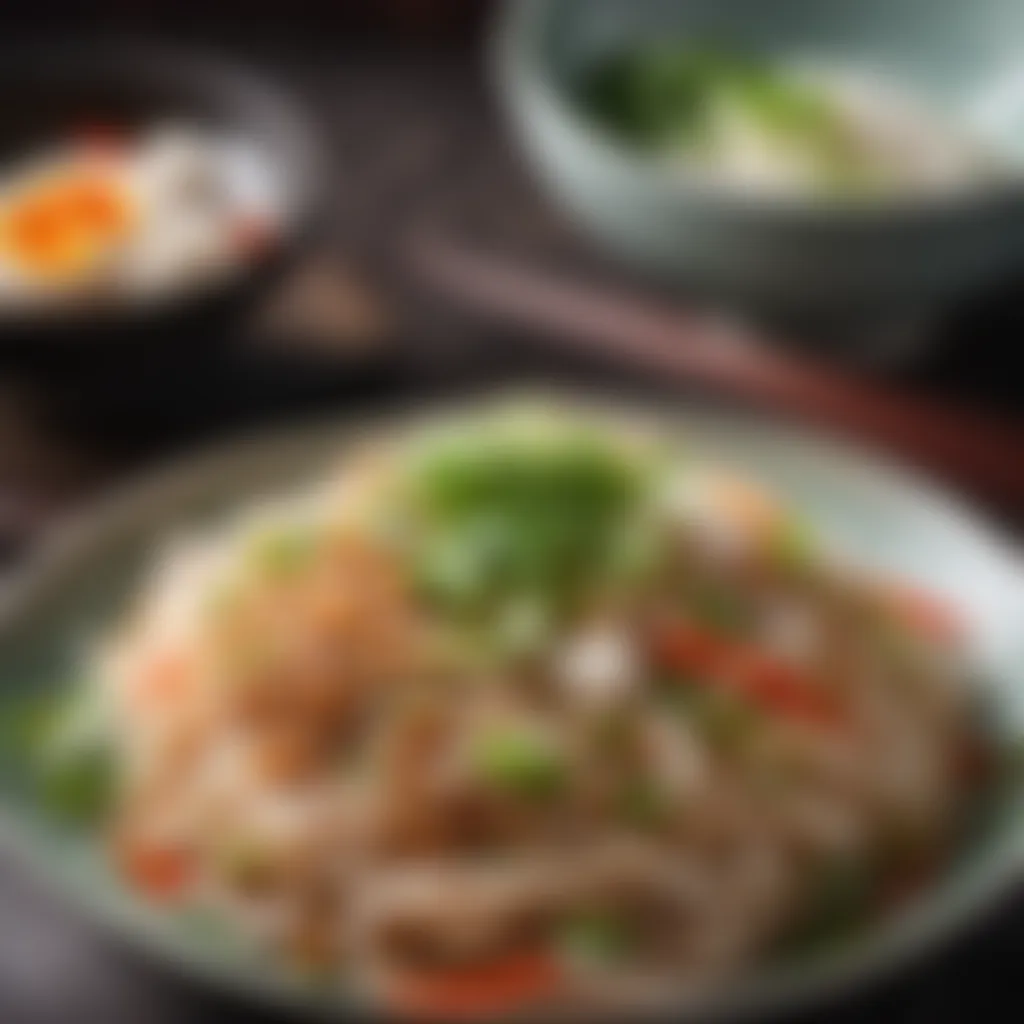
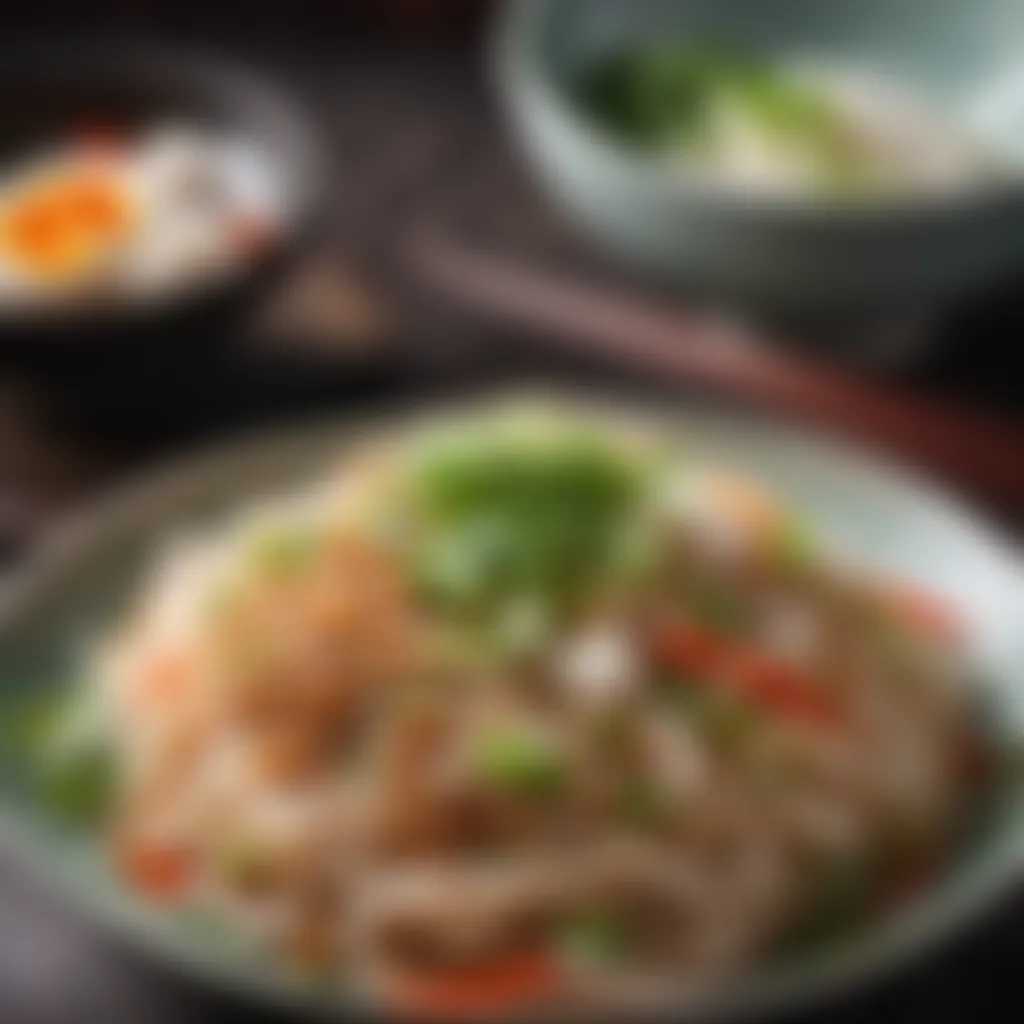
Intro
Drunken Noodles, known as Pad Kee Mao in Thai, present a delightful clash of flavors and textures that dance on the palate. This stir-fried noodle dish is not only comforting but also remarkably versatile, allowing room for creativity in both its ingredients and preparation method. Steeped in Thailand’s rich culinary history, the dish gets its name from the notion that it pairs well with a good drink, often enjoyed after a long night out.
In this guide, we will take a deep dive into the art of preparing Drunken Noodles, ensuring that you can recreate this sublime dish right in your own kitchen. From the list of essential ingredients to the nitty-gritty of cooking techniques, each section aims to equip you with the knowledge and confidence to master this beloved culinary creation.
Let’s roll up our sleeves and get started. First, we will outline all the ingredients you'll need to set the stage for a fabulous cooking experience.
Ingredients:
When making Drunken Noodles, the right balance of ingredients is key to achieving that authentic flavor. Below is a clearly itemized list of ingredients with exact measurements:
- Flat rice noodles - 8 ounces (preferably fresh)
- Vegetable oil - 2 tablespoons
- Garlic - 3 cloves, minced
- Shallots - 2, thinly sliced
- Thai bird’s eye chilies - 2, chopped (adjust to spice preference)
- Chicken breast - 8 ounces, sliced thinly (or tofu for a vegetarian option)
- Bell pepper - 1, julienned (any color)
- Carrot - 1, julienned
- Basil leaves - 1 cup, Thai basil preferred
- Soy sauce - 3 tablespoons
- Oyster sauce - 2 tablespoons
- Fish sauce - 1 tablespoon
- Sugar - 1 teaspoon
- Lime juice - 1 tablespoon
- Green onions - 2, chopped (for garnish)
With this medley of ingredients gathered, you are primed for the next phases that involve preparation. Let’s move on to how to effectively prepare these components for cooking.
Preparation Steps:
- Soak the Noodles: If using dried flat rice noodles, soak them in warm water for about 30-40 minutes or until they are soft but not overly mushy. Drain and set aside.
- Prep the Veggies: Slice your shallots, garlic, and bell peppers. Make sure your chilies are finely chopped for added kick.
- Marinate the Chicken (or Tofu): In a bowl, combine sliced chicken (or tofu), 1 tablespoon of soy sauce, and a sprinkle of pepper. Let it marinate for at least 15 minutes.
- Gather Everything Nearby: Keep all prepared ingredients within reach, as stir-frying moves quickly and you’ll need to act fast.
Technical Aspects:
Now that everything is prepped, it's important to get your cooking setup right. Here are some technical aspects to consider:
- Heat Level: Use high heat throughout the cooking process. This helps in achieving that smoky flavor characteristic of a well-cooked stir-fry.
- Timing: This dish comes together rather quickly, generally under 15 minutes of cooking time once you start. Have everything ready prior to firing up the stove.
- Equipment: A wok is preferable, but a large skillet can work as well. Just ensure it's roomy enough to hold all the ingredients comfortably.
Cooking Process:
- Heat the Oil: In your wok, add the vegetable oil over high heat. Allow it to warm until it shimmers but doesn’t smoke.
- Saute Aromatics: Quickly toss in minced garlic, sliced shallots, and chilies. Stir-fry for around 30 seconds until fragrant, being careful not to burn them.
- Cook the Protein: Add your marinated chicken (or tofu) and stir-fry until it turns golden and is cooked through. This will take about 3-4 minutes.
- Introduce Veggies: Toss in your bell peppers and carrot slices, stir-frying for another 2 minutes until they begin to soften.
- Add Noodles: Now, add in the soaked flat rice noodles to the wok. Pour in remaining soy sauce, oyster sauce, fish sauce, and sugar. Toss everything together—make sure to mix well to coat the noodles evenly.
- Finish with Basil: Just before everything’s done, toss in the basil leaves and lime juice, giving it a final mix for about a minute more.
- Garnish: Serve immediately, garnished with chopped green onions.
Troubleshooting Tips:
- Noodles Sticking Together: If your noodles are sticking, try soaking them a bit longer or dusting them lightly with cornstarch before cooking.
- Overcooked Protein: If the chicken (or tofu) seems tough, reduce your heat and ensure you're not cooking too long. Tenderness is key here.
- Adjusting Spice: If it’s too spicy, balance with a bit more sugar or a splash of lime juice to cut the heat.
Ultimately, it’s all about personal preference and adapting the dish to your own taste.
Now that we’ve gone through all the essential ingredients, preparation, and cooking methods, you’re set to savor Drunken Noodles, a dish that is bound to be a hit at your dining table.
Understanding Drunken Noodles
When it comes to Thai cuisine, few dishes hold the same allure as drunken noodles. This beloved stir-fry dish, known as pad kee mao, is not just a meal; it encapsulates a rich tapestry of history, flavors, and cultural practices. Understanding the intricacies of drunken noodles allows the home cook to appreciate the layers of tradition and creativity packed into each bite. It's important to recognize that every element, from the choice of noodles to the selection of vegetables, plays a vital role in creating the perfect balance of taste and texture.
The significance of drunken noodles extends beyond mere sustenance. They offer a glimpse into the social fabric of Thai dining, where food is often enjoyed in the spirit of community. Knowing how to prepare them not only adds variety to your culinary repertoire but also connects you to time-honored practices that have transcended generations.
Historical Background
The origins of drunken noodles can be traced back to the bustling streets of Thailand. The dish is said to be inspired by the late-night food culture, where hungry patrons sought quick yet satisfying meals to fuel their late-night escapades. It is believed that the dish owes its name to the combination of bold flavors that bring a sense of indulgence, almost as though one is savoring it after a night of festivities.
Interestingly, the early renditions of drunken noodles were somewhat simpler in both ingredients and preparation. Traditional recipes often utilized leftover ingredients, showcasing the Thai principle of maximizing the use of available resources. Over time, the dish evolved, incorporating a wider array of proteins and seasonal vegetables, seamlessly reflecting the local tastes and ingredients available throughout the country. This adaptability is a prime example of why drunken noodles have remained a staple not just in homes, but also in restaurants globally.
Cultural Significance
Drunken noodles are a culinary emblem of balance and versatility, making them more than just a favorite food. They embody the communal aspect of dining in Thai culture. Sharing a substantial dish like this fosters connection, much like gathering around a table familarizes family and friends alike.
This dish, often enjoyed with a hint of spice, also illustrates the common appreciation for heat in Thai cooking. The choice of fresh herbs, particularly basil, combined with chilies, elevates the flavor profile, creating a complex yet harmonious taste.
Moreover, drunken noodles often represent adaptability, as the ingredients can be modified for dietary preferences, making them a suitable choice for gatherings that include vegetarians, meat-lovers, and even those seeking gluten-free options. Their capacity to cater to diverse palates speaks to the broader narrative of how Thai food brings people together, transcending boundaries and traditions, ultimately making each dining experience unique.
Understanding drunken noodles opens the door to exploring the nuances of Thai culinary arts, enriching your appreciation and cooking skills. Their fusion of flavors mirrors the vibrant cultural landscape of Thailand.
Essential Ingredients
Making Drunken Noodles wouldn't be right without a deep understanding of the essential ingredients that bring this dish to life. Each element plays a vital role, influencing not just the overall flavor but also the texture and nutritional value of the dish. When you truly grasp the importance of these ingredients, you can create a meal that's not only authentic but also delightful in every bite.
Key Noodle Types
Noodles are the backbone of this dish, and choosing the right type is non-negotiable. For Drunken Noodles, flat rice noodles—often referred to as sen yai—are the traditional choice. These wide noodles soak up sauces beautifully and hold their shape while being stir-fried.
The preparation is simple but crucial: boil them just enough so they are al dente. Overcooking could lead them to become mushy, which is not what you want. A good trick is to slightly undercook them before adding to the wok, as they’ll continue to cook while absorbing flavors from the sauces.
If you can't find rice noodles, egg noodles can serve as a substitute, although they do shift the dish's authenticity a tad.
Protein Choices
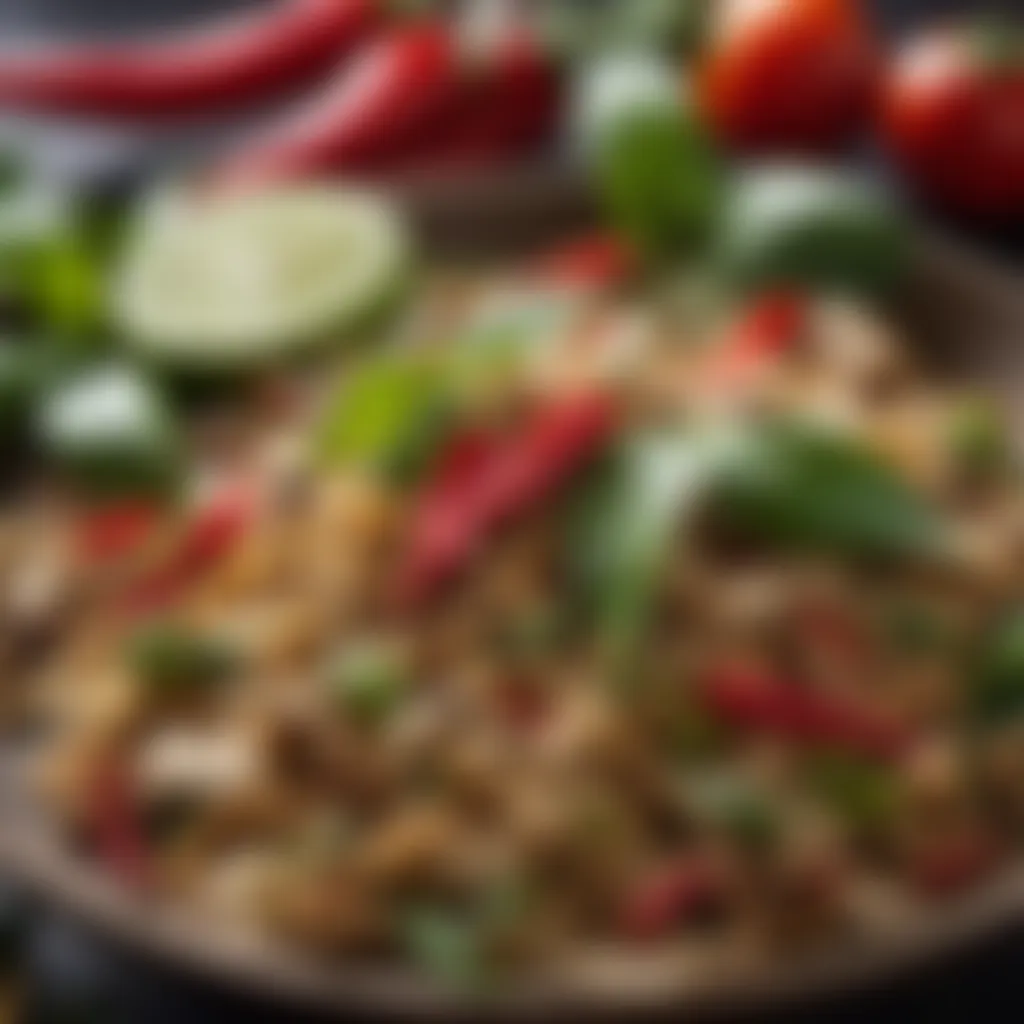
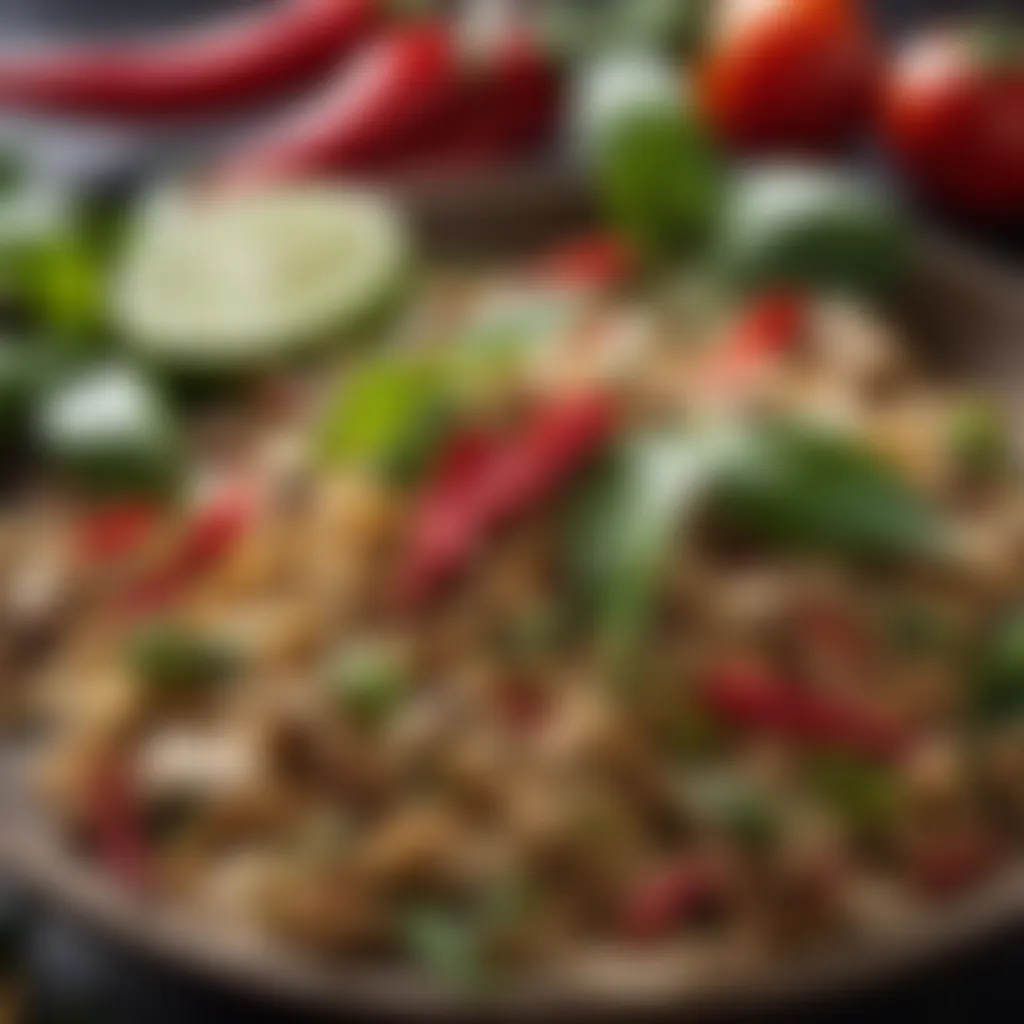
When it comes to proteins, the sky’s the limit. Traditional recipes may use chicken, beef, or shrimp—each option brings distinct flavors and textures. Chicken is perhaps the most common, providing a tender bite that complements the hearty noodles. Beef, especially cuts like flank steak, gives a rich flavor that pairs well with the spices. Shrimp, meanwhile, cooks quickly and adds a lightness to the dish.
Don’t overlook alternatives like tofu, which is perfect for vegetarians or those wanting a lighter meal. Make sure it's extra firm; slice it and give it a quick pan-sear for the best texture. The key: marinate your protein for about 30 minutes before cooking. This brief period allows the flavors to infuse, making every bite memorable.
Vegetable Varieties
Vegetables contribute color, nutrition, and a fresh, crisp texture to Drunken Noodles. Look for vibrant bell peppers, both red and green, as they add sweetness and crunch. Carrots are another great choice; their natural sugars balance well with the heat in the dish.
Bok choy or Chinese broccoli offers a slight bitterness that can create a beautiful contrast with the other flavors. And don't forget about onions—½ to 1 cup of sliced onions can bring an aromatic depth that elevates the dish. This is also where you can get creative; snow peas, bean sprouts, or zucchini all work marvelously in providing some crunch.
Flavor Enhancers
The magic of Drunken Noodles often lies in the sauces and seasonings used. At its core, soy sauce serves as the foundational flavor; both light and dark varieties can be used to build depth. Fish sauce adds an umami kick that many find irresistible. Don’t shy away from oyster sauce either—it's thick, sweet, and wonderfully savory.
Next up, the heat! Thai bird's eye chilies are your best friends if you enjoy a solid kick. Start with one or two, finely chopped, depending on your tolerance.
Finally, a squeeze of lime or some fresh basil can balance the robustness of the dish while adding that exquisite touch of freshness.
To sum it up, the right ingredients can turn a simple dish into an extraordinary experience, so take the time to select them wisely.
Preparing the Ingredients
In crafting Drunken Noodles, the importance of preparing the ingredients cannot be overstated. This foundational step not only sets the stage for a harmonious blend of flavors but also ensures that each component sings in the final dish. You see, culinary success often hinges on *quality and freshness. Choosing the right ingredients influences not just taste, but also texture, color, and even the overall enjoyment of the meal. Let’s dive into the nitty gritty of selecting and preparing these key elements.
Choosing Fresh Produce
Selecting fresh produce is akin to picking the finest jewels for a crown. When it comes to Drunken Noodles, fresh vegetables like bell peppers, broccoli, and Thai basil elevate the dish considerably. Simply put, fresh produce bursts with flavor and provides a vibrant crunch that pre-packaged options can’t compete with. Here are a few things to consider:
- Seasonal Selections: Opt for what's in season. This not only guarantees fresher taste but also often encourages local farming practices.
- Color and Texture: Eyeing a wide variety of colors makes the dish more visually appealing. Take those bright carrots or striking green beans and chop them up!
- Smell and Feel: A quick whiff can tell you if something’s gone off. Gently squeeze fruits and veggies to check for firmness.
Don’t shy away from your local farmers’ market. There, you can find organic and perfectly ripe produce that will make your dish sing.
Marinating Proteins
Marinating proteins such as chicken, beef, or tofu is another intricate layer of flavor that enhances this dish. The marinating process allows the proteins to soak in complex flavors, creating a sumptuous bite. But why does it matter? Marinating does the following:
- Tenderizes Meat: This is essential for a pleasing texture, especially with tougher cuts of meat. Marinades containing acidity from ingredients like lime juic or soy sauce break down tough proteins.
- Deepens Flavor Profile: Just a few hours in a marinade can substantially elevate the taste. Think of a blend of soy sauce, oyster sauce, and garlic to create a luxurious base flavor.
- Seals in Moisture: Proteins can dry out quickly while cooking. A good marinade can help retain moisture, keeping your dish juicy.
Marinate your proteins for at least 30 minutes, but letting them sit for up to 24 hours in the refrigerator will develop even richer flavors.
Noodle Preparation Techniques
Noodles, being the heart of Drunken Noodles, deserve special attention. The technique employed in preparing these carbs can make or break your dish. Here’s a breakdown of effective methods to ensure your noodles are spot on:
- Selecting the Right Noodle: Traditionally, wide rice noodles such as Sen Yai are used, which have a great chewy texture. Avoid overcooked or soft noodles by cooking them to al dente before adding to the wok.
- Rinsing After Cooking: Once you’ve cooked your noodles, a quick rinse under cold water prevents them from becoming mushy. This helps maintain that all-important bite.
- Stir-Frying with Precision: Incorporate your noodles at the right moment in the cooking process. This usually means adding them after your proteins and vegetables have begun to cook, stirring quickly to combine all flavors.
Remember: Preparing your ingredients is not a simple task, but it is the backbone of creating delectable Drunken Noodles. By choosing the freshest produce, thoughtfully marinating your proteins, and applying effective noodle preparation techniques, you elevate your dish to something truly exceptional.
Cooking Method
The cooking method you choose for making Drunken Noodles is as crucial as the ingredients themselves. It's sort of the backbone of the dish, helping to bring everything together. Each technique can affect not only the flavor but also the texture and appearance of the final meal. Drunk or sober, using the right method can transform the ordinary into the extraordinary. It’s about harmonizing flavors and showcasing those ingredients you've carefully selected.
Choosing the Right Equipment
When you're diving into the world of Drunken Noodles, having the right gear can make a world of difference. A wok is often the star of the show here. Its high sides and even heat distribution allow for quick, efficient stir-frying. But let’s not stop there! You’ll also need a good knife for chopping, a cutting board, and maybe a spatula that can withstand high heat.
Why the Wok? Well, that’s where the magic happens. Its shape makes tossing ingredients easy, ensuring everything cooks uniformly. Plus, if sautéed over high heat, it’ll give your noodles that coveted smoky flavor known as ‘wok hei.’ If you don’t have a wok, a large frying pan can suffice, but the results may not be as compelling.
Step-by-Step Cooking Process
Now, let’s roll up our sleeves and get into the nitty-gritty! The cooking process for Drunken Noodles can be broken down into three essential aspects, each playing a meaningful role.
Stir-Frying Techniques
Stir-frying is where the fun begins. This method is popular for a reason; it’s fast and allows flavors to meld seamlessly. The beauty of stir-frying lies in its ability to cook at high temperatures quickly, sealing in the moisture without making the dish soggy. It turbocharges the vegetables and proteins, making them tender yet crisp.
A key characteristic of this technique is the constant movement of the ingredients. You want to keep things in motion to avoid burning. This often means using a spatula or a wide, flat spoon to ensure everything gets its share of the heat. One unique feature of stir-frying is its versatility; you can adjust heat levels as you go, providing room for improvisation.
Adding Ingredients in Sequence
The order in which you add ingredients can dictate the overall balance of flavors. For example, proteins usually go in first since they take longer to cook, followed by harder vegetables like carrots, and finally softer ones like bell peppers and leafy greens. This method not only allows for even cooking but also ensures that delicate ingredients don’t overcook.
This practice enhances the dish greatly; it keeps everything harmonious. The unique advantage here is that you can taste and adjust flavors as you go, like adding more soy sauce or sriracha to tailor it to your liking, ensuring each bite packs a punch.
Achieving Desired Texture
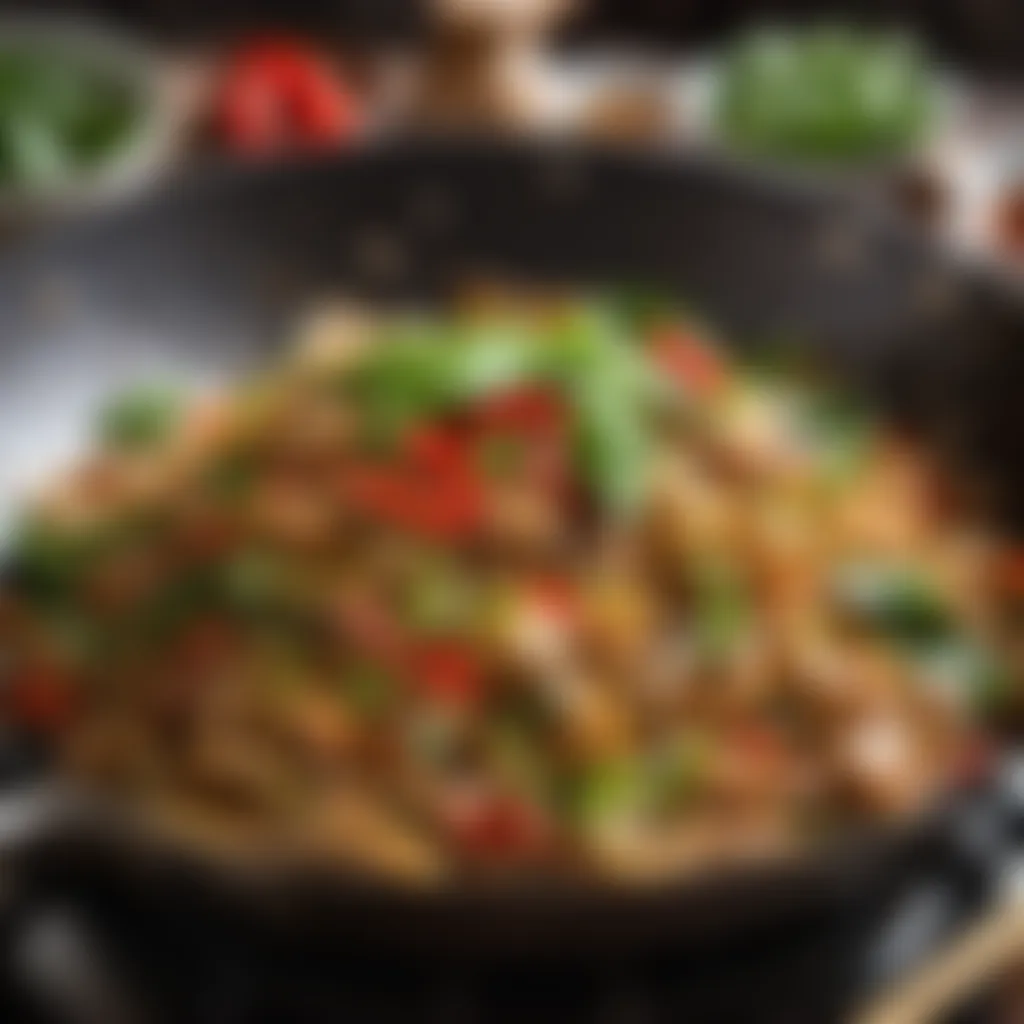
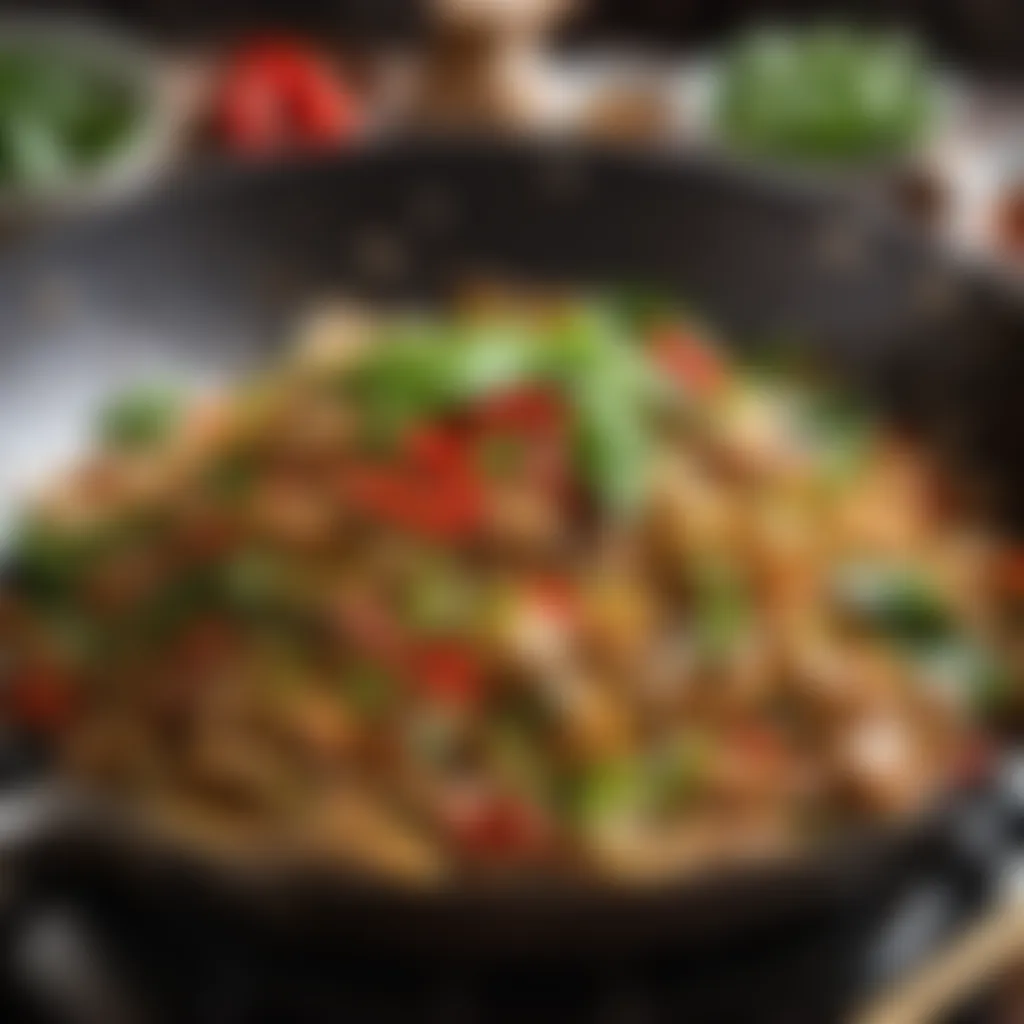
Texture is king in a great plate of Drunken Noodles. You want a balance of chewiness from the noodles and crispiness from the veggies. Achieving this involves keeping an eye on cooking times and high heat, but you can also use water or broth at the end to create a slight steam effect, which can soften the noodles a touch while still letting them retain their shape.
What’s notable about focusing on texture is it reinforces the overall dining experience. It’s not just a meal; it’s an adventure for the senses. However, if overcooked, the dish can turn limp, which removes the pleasant contrasts that make it special.
"The cooking method can bridge the gap between simple and sublime; it shows how essential technique is in the art of cooking."
All these factors come together to create a dish that isn’t just tasty, but a delightful culinary experience. No matter how many times you’ve made Drunken Noodles, revisiting the cooking method can enrich your understanding and appreciation of this iconic dish.
Common Variations
Drunken Noodles have become quite the culinary chameleon, adapting beautifully to various tastes, dietary preferences, and regional influences. This versatility is not just a mere footnote; it’s a vibrant chapter in the story of this beloved dish. Understanding these variations helps in crafting a richer culinary tapestry, allowing you to tailor each dish to your audience or occasion. Being aware of these differences can elevate a simple dinner to a memorable feast.
Regional Adaptations
When it comes to Drunken Noodles, regional adaptations stir up a flavorful debate. In Thailand, locations such as Bangkok may favor bolder spice profiles, while areas up north, like Chiang Mai, might offer a version that's a bit on the sweeter side. Each region’s access to fresh ingredients and local culinary traditions influences how the dish is prepared.
For instance, in southern Thailand, people might toss in juicy seafood, reflecting local fishing practices. Here’s a quick rundown of some regional twists you might come across:
- Bangkok Style: Stronger flavor profile with a medley of flavors using fish sauce and chili.
- Chiang Mai Style: Adds a hint of sweetness and sometimes incorporates fresh herbs such as coriander.
- Northeastern Style: Often includes more vegetables, giving it a crunchy texture, along with a generous splash of lime for a zesty finish.
By exploring these variations, you're not only indulging in diverse flavors but also honoring the origins and customs tied to this dish.
Vegan and Vegetarian Options
Embracing a plant-based lifestyle doesn’t mean you have to miss out on the delights of Drunken Noodles. The beauty of this dish lies in its adaptability; it can easily transition to a vegan or vegetarian delight without sacrificing taste or texture. There are various ways to replace traditional meat ingredients.
Instead of chicken or pork, consider:
- Tofu: Firm tofu marinated and stir-fried until crispy adds a satisfying texture.
- Seitan: This wheat-based protein mimics meat's chewiness, perfect for those who miss that texture.
- Mushrooms: Varieties like shiitake or portobello bring umami-rich flavors, making the dish hearty.
Additionally, dark leafy greens such as bok choy or kale can be included to boost nutrition while adding color and crunch. Remember to play around with sauces; tamari or soy sauce can deliver the depth of flavor typically offered by fish sauce, making the dish equally tasty.
Spice Level Adjustments
Spice is the heart and soul of Drunken Noodles, and tailoring it to your palate can make all the difference. The great thing about this dish is its adaptability, allowing you to dial up or down the heat based on preference. A gentle kick might be all you need, or perhaps a fiery experience is what you're after.
Here are some tips to adjust the spice level:
- Chili Peppers: Use fresh or dried chilies, adjusting the quantity to modify the heat.
- Chili Paste: Incorporate sambal oelek or a homemade chili garlic paste for a concentrated kick.
- Balance with Sweetness: A bit of sugar can mellow out strong spices, creating a more balanced flavor.
To take it a step further, consider offering a side of chili flakes or hot sauce at the table, letting to diners customize their noodles to their liking. This not only engages everyone in the meal but also creates an interactive dining experience.
"A dish can tell a story, and when you adjust it to your taste, you become part of that narrative."
Understanding these variations allows you to embark on your own delightful culinary adventure. Next time you whip up some Drunken Noodles, think about how you can make them uniquely yours.
Presentation and Serving
The act of placing food on a plate is an art form in its own right, particularly when it comes to dishes as vibrant and flavorful as Drunken Noodles. While the taste of a meal can be unforgettable, the presentation plays a crucial role in elevating the dining experience. Think of it as the cherry on top; it can make a simple dish feel like a luxury meal. In this section, we'll explore plating techniques and suggestions for accompaniments that not only complement the main dish but also enrich the overall experience of enjoying Drunken Noodles.
Plating Techniques
When it comes to plating Drunken Noodles, the goal is to showcase the bright colors and textures that embody this dish. Begin by selecting a wide, shallow bowl or plate. This allows the noodles to spread out, giving the visual impact that can make anyone's mouth water. Here are some tips to keep in mind:
- Layering: Start by placing a base of noodles, twirling them into a nest-like shape. Place the protein and vegetables on top for balance.
- Garnishing: Fresh cilantro, basil, or lime wedges can add a pop of color. They also enhance the aroma, making the dish even more inviting. Consider using a microplane to grate fresh lime zest for a finishing touch.
- Height and Dimension: Don’t flatten everything onto the plate. Adding a bit of height will make your dish look upscale and more appealing. Think about leaning a piece of protein on the noodles, perhaps leaning it slightly to convey a sense of abundance.
Accompaniments and Pairings
The flavors of Drunken Noodles can be complemented beautifully with the right accompaniments. Here are some suggestions:
- Thai Spring Rolls: These fresh rolls packed with vegetables and herbs make for a refreshing start to the meal, their crunch pairs well with the soft texture of the noodles.
- Cucumber Salad: Drizzling a simple salad made of cucumbers, mint, and a light dressing brings a cool contrast to the spice of the noodles.
- Beverage Pairings: For those wishing to embrace a full culinary experience, pairing with a Thai iced tea or a light beer can enhance the flavors.
"Great food isn’t just about taste; it also has to look good on the plate!"
Dinner is more than just a meal; it’s an experience. By taking care in how Drunken Noodles are plated and what is served alongside, you transform your dinner into something memorable. The right presentation and side dishes will not only impress guests but also enrich each bite, creating a satisfying and exquisite culinary adventure.
Pairing Beverages
Choosing the right beverages to accompany your Drunken Noodles can heighten the overall dining experience. After all, the right drink can complement the dish's bold flavors, enhance its spices, and balance its richness. For many cultures, pairing food and drink isn't just a matter of taste; it's an art that reflects traditions and personal preferences. For housewives looking to make every meal exceptional, knowing what to serve can turn a simple dinner into a culinary journey.
Traditional Thai Beverages
When it comes to traditional Thai beverages, options abound that can elevate your meal. Here are a few that can elevate the flavors of your Drunken Noodles:
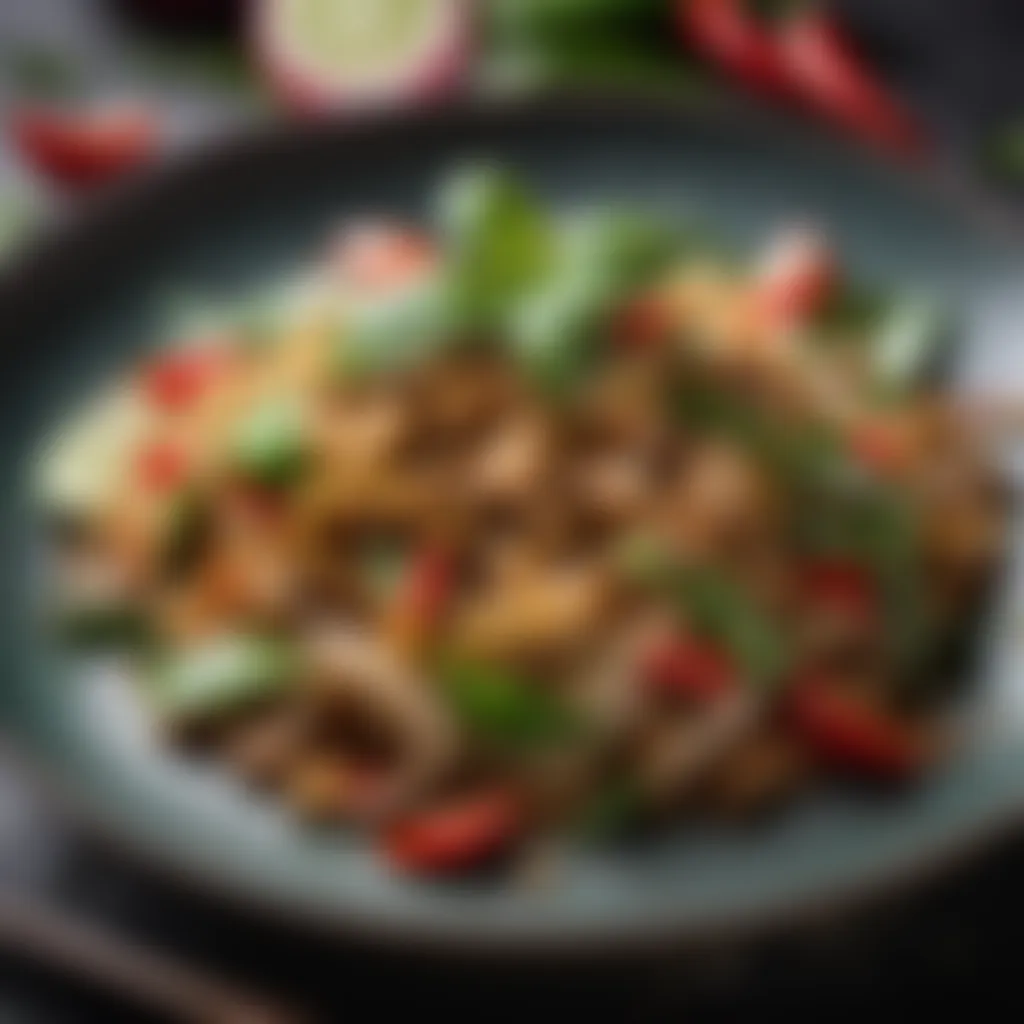
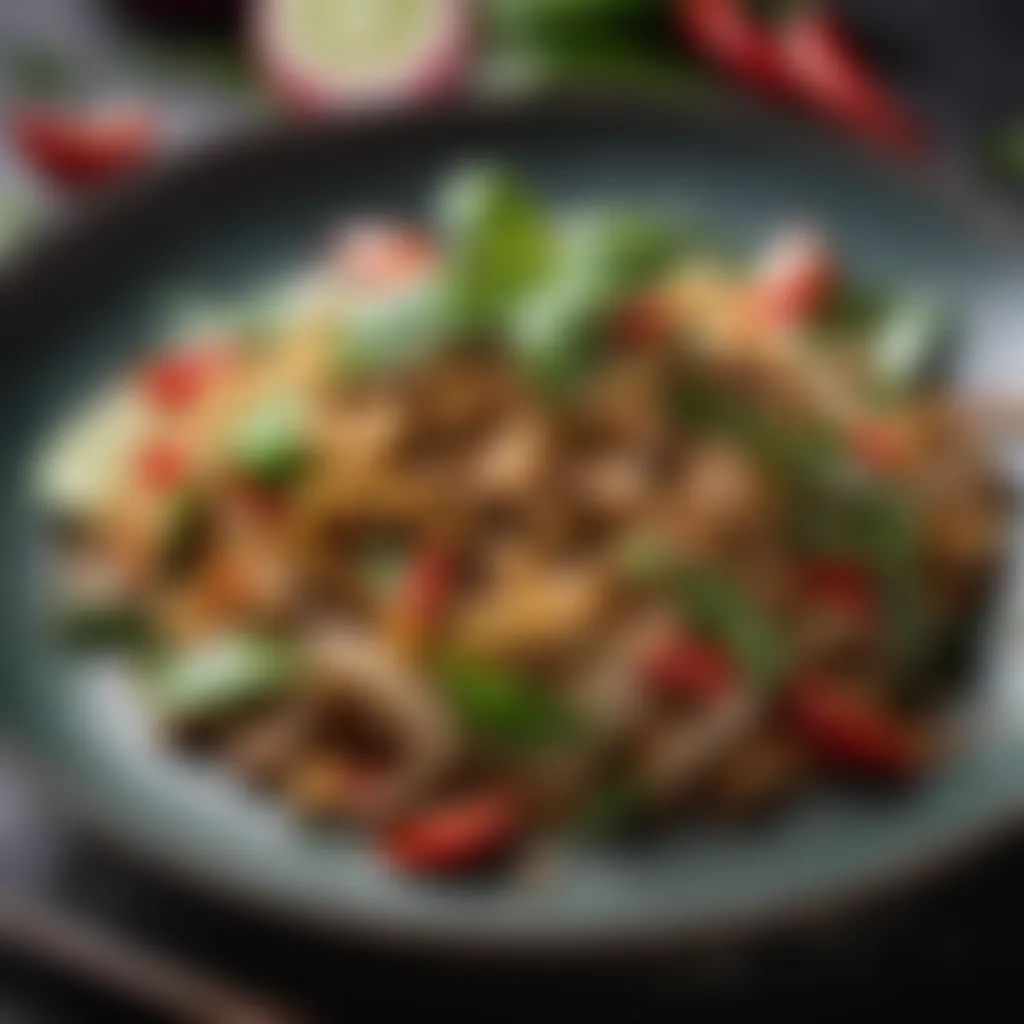
- Thai Iced Tea: This sweet and creamy concoction brings a lovely contrast to the savory and spicy elements of the dish. The robust flavor of the tea cuts through the richness of the noodles, offering a refreshing palate cleanse.
- Lemongrass Drink: Known for its citrusy zest, lemongrass tea or drink provides a fresh element that complements the flavors beautifully. It's light and fragrant, enhancing the overall Thai culinary experience.
- Coconut Water: A natural choice, this drink not only hydrates but also adds a subtle sweetness that pairs nicely without competing for attention. The tropical notes can transport you to the beautiful beaches of Thailand with every sip.
Modern Pairing Suggestions
Though traditional beverages hold their charm, considering modern options can also bring a delightful twist to your meal.
- Craft Beers: A light, crisp lager or an IPA with its hoppy bitterness can be a great pairing. The carbonation and hoppy flavors can play off the spices in your noodles, making each bite more enjoyable.
- White Wine: A chilled Sauvignon Blanc or Riesling can introduce fruit-forward notes that contrast sharply with the bold flavors of Drunken Noodles. The acidity in the wine can help cleanse the palate, allowing for a fuller appreciation of each flavor in your dish.
- Sparkling Water with Lime: If you prefer a non-alcoholic option, sparkling water with a splash of fresh lime can be refreshing and palate-cleansing. It enhances your meal without overwhelming the dish's flavors.
"Pairing your Drunken Noodles with the right beverage is like adding a final brushstroke to a masterpiece; together, they create harmony and elevate the dining experience to new heights."
By thoughtfully considering the beverages you choose, you're not just serving a meal, but creating an experience that resonates with the essence of Thai cuisine. Each sip can take you deeper into the flavors of your dish, offering a deeper appreciation for the culinary adventure you've embarked upon.
Exploring Nutritional Aspects
When indulging in the flavorful experience of Drunken Noodles, understanding the nutritional aspects becomes essential. Not just for the taste, but for the body as well. This dish isn’t just a delight for the senses; it can play a role in a balanced diet if approached mindfully. Balanced eating often means being aware of macronutrients, which fuels our bodies, and considering our health needs while enjoying culinary creations. Let’s break down these aspects to enlighten readers on how to enjoy Drunken Noodles while being health-conscious.
Macronutrient Breakdown
Drunken Noodles are diverse, and their macronutrient composition can vary greatly depending on the ingredients used. Generally, this dish contains three main macronutrients: carbohydrates, proteins, and fats. Here’s a breakdown:
- Carbohydrates: The noodles are the primary source of carbohydrates. They provide quick energy, essential especially if served after a workout. Common noodle types include rice noodles or wheat noodles, both of which carry different fiber levels.
- Proteins: The choice of protein varies widely, including chicken, shrimp, or tofu. Proteins are crucial for muscle repair and growth, making them an essential component for those aiming for strength. By picking lean protein options, one can cut excess fat while gaining the needed nutrients.
- Fats: Fats in Drunken Noodles primarily come from cooking oils and possibly from certain protein sources. Healthy fats, like those from good oils, are beneficial for heart health and hormone balance.
A well-balanced plate usually consists of 50% carbs, 30% protein, and 20% fats. Adapting these proportions in your Drunken Noodles can make it healthier.
By modulating these components according to dietary needs, one can enjoy this dish both deliciously and nutritiously.
Health Considerations
When it comes to health, indulging in Drunken Noodles can ignite some deeper reflections. It’s essential to consider a few critical factors:
- Sodium Content: Certain sauces, especially soy sauce or fish sauce, can elevate sodium levels. High sodium consumption can lead to various health issues like hypertension. Opting for low-sodium alternatives or using less sauce can mitigate these effects.
- Caloric Density: With added ingredients and larger servings, the calorie content can also skyrocket. It’s easy to overeat when the dish is enticing. Keeping portion sizes in check can help maintain a balanced caloric intake.
- Allergen Awareness: For those with specific food allergies, substituting ingredients is vital. For instance, gluten-sensitive individuals might prefer rice noodles whilst keeping an eye on sauces containing allergens.
- Balanced Accompaniments: Pairing Drunken Noodles with a fresh salad or steamed veggies can enhance nutrients and add volume without extra calories. This promotes a fuller feeling and provides other vitamins and minerals.
Keeping these considerations in mind allows anyone to savor Drunken Noodles as a delightful yet mindful culinary adventure. By being aware of what’s in the bowl, every bite can be part of a wholesome experience.
The Joy of Cooking Drunken Noodles at Home
Cooking Drunken Noodles, or Pad Kee Mao, at home isn't just about creating a delicious meal; it embodies the spirit of exploration and creativity in Thai cuisine. This dish, known for its vibrant flavors and harmonious blend of textures, has the power to turn your kitchen into a sanctuary of aromatic delights. By embarking on this culinary journey, you can craft a plate that not only satisfies your taste buds but also reflects your personal flavor preferences.
Personalizing Your Recipe
One of the most rewarding aspects of making Drunken Noodles is the flexibility it affords. Every chef, whether a novice or seasoned, can tailor the recipe to suit individual tastes. This personalization allows for a delightful twist on tradition while still honoring the essence of the dish. Here are a few ways to make the recipe your own:
- Noodle Selection: While the classic approach typically utilizes wide rice noodles, the beauty of cooking at home lets you swap in other types such as fettuccine or even gluten-free alternatives, like rice vermicelli.
- Protein Choices: Whether you're a meat lover or leaning toward plant-based eating, options abound. From succulent chicken or shrimp to tofu or tempeh, each ingredient lends its unique character to the dish.
- Veggie Medley: Incorporating seasonal vegetables adds an inviting crunch. Think of vibrant bell peppers, fresh bok choy, or even a splash of baby corn for color and texture.
- Sauce Variations: The charm of Drunken Noodles lies in its signature sauce. Feel free to experiment with the proportions of soy sauce, oyster sauce, and even a hint of chili paste. Adding more or less according to your heat preference gives you full creative control.
The act of personalizing the recipe not only changes the taste but also elevates the joy of cooking. You become part of a creative process, transforming ingredients into a dish that speaks to your heart.
Gathering with Friends and Family
Cooking is inherently a communal activity, and the process of making Drunken Noodles is no exception. The very idea of whipping up a batch of this dish becomes more enjoyable when shared with loved ones. The kitchen transforms into a lively gathering space, filled with laughter, stories, and of course, the savory aromas wafting through the air.
- Hands On Experience: Invite family members into the kitchen for a hands-on experience. Anyone can chop vegetables or marinate proteins. This shared effort not only lightens the workload but creates cherished moments as you collaborate in crafting a delicious meal together.
- Family Style Serving: When it's time to eat, serve the noodles family-style. This allows everyone to partake at their own pace, adding to the relaxed atmosphere. Sitting around the table, enjoying the fruits of your labor, fortifies bonds.
- Storytelling Over Dinner: As you savor the delightful flavors of your homemade Drunken Noodles, encourage conversations about food memories and culinary traditions. Each bite can spark reminiscences and dreams, making dinner not just a meal, but an experience rich with connection and nostalgia.
"Cooking fills the home with warmth and creates lasting memories. Sharing meals can strengthen the thread of tradition, thereby enriching our culinary journey."
Making Drunken Noodles at home, therefore, becomes more than just satisfying a hunger. It is part of a larger story that connects the cook with their culture, with their loved ones, and ultimately with themselves. So gather your ingredients, bring your family together, and enjoy the magical process of cooking and sharing!
End
In the exploration of Drunken Noodles, it becomes clear just how pivotal the conclusion is for anyone embarking on their culinary adventure. This section serves as a synthesis of all the engaging information presented throughout the article, ensuring that readers leave with a firm grasp of both the history and practices essential to this beloved dish.
Drunken Noodles, with its vibrant mixture of flavors and textures, holds a special place in the realm of Thai cuisine. Reflecting on the culinary journey allows one to appreciate not only the dish itself but also the rich tapestry of cultural significance it weaves through each ingredient and cooking technique. Understanding the evolution of this iconic meal enhances the overall experience, making it more than just something to eat.
Additionally, the conclusion encourages readers to connect with the process of making Drunken Noodles. Cooking can be a meditative, satisfying experience that brings a sense of fulfillment when flavors meld harmoniously. The process of creating this dish is an invitation to delve deeper into a world of vibrant spices, fresh produce, and personal touches that speak to individual taste.
Reflecting on the Culinary Journey
Reflecting on this culinary journey brings to light the rich complexity involved in the art of making Drunken Noodles. It's not merely a matter of gathering ingredients and following a recipe; it’s about immersing oneself in the tradition and creativity that this dish embodies. Think about the first time you tasted Drunken Noodles— the flavors dance on your palate, leaving a lasting impression, and now the goal is to recreate that experience in your own kitchen.
When you take the time to appreciate each ingredient, you honor the cultural heritage from which this dish originates. The garlic, the palm sugar, the Thai basil—all come together in a brilliant symphony of taste. Cooking is almost a personal dialogue with those who’ve prepared this dish before you, and reflections on this journey can illuminate your path as you choose your own approaches and techniques.
"Cooking is like painting a canvas, where every color and brushstroke counts."
Encouragement to Experiment
The kitchen is a playground, and experimenting with Drunken Noodles opens the door to limitless possibilities. Each cook has the opportunity to infuse their personality and preferences into this dish. Maybe you prefer a little kick of chili or a sweeter profile with just a hint of extra palm sugar. Don't shy away from tossing in that unusual vegetable from your local market or substituting proteins based on what you have on hand.
Here are a couple of suggestions for considering experimentation:
- Use Different Proteins: If beef or chicken doesn't tickle your fancy, consider shrimp or tofu for a different texture and flavor.
- Alter Spice Levels: Experiment with the heat by adding more chili or even some chili oil for those who crave a spicier adventure.
- Play with Vegetable Choices: Swap bell peppers for bok choy or add more herbs like cilantro or mint for an unexpected freshness.
Ultimately, the important message here is that cooking should be a joyous exploration. Embrace the freedom to play with flavors. This act of creation not only enhances your cooking skills but also truly reflects who you are. Through each attempt, whether it be successful or not, you gain valuable insights that enrich your understanding of this delightful culinary art. Be encouraged to take risks and have fun in the kitchen as you journey through the wonderful world of Drunken Noodles!







